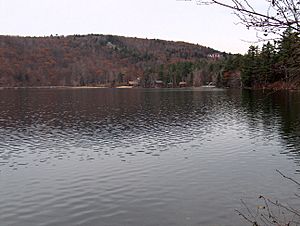Dublin Pond facts for kids
Quick facts for kids Dublin Pond |
|
|---|---|
| Dublin Lake | |
 |
|
| Location | Cheshire County, New Hampshire |
| Coordinates | 42°54′23″N 72°05′02″W / 42.90639°N 72.08389°W |
| Primary outflows | tributary of Minnewawa Brook |
| Basin countries | United States |
| Max. length | 0.8 mi (1.3 km) |
| Max. width | 0.6 mi (0.97 km) |
| Surface area | 236 acres (0.96 km2) |
| Average depth | 64 ft (20 m) |
| Max. depth | 100 ft (30 m) |
| Surface elevation | 1,480 ft (451 m) |
| Settlements | Dublin |
Dublin Pond, also known as Dublin Lake, is a beautiful body of water in New Hampshire, United States. It covers about 236-acre (0.96 km2) of land. You can find it in Cheshire County, in the town of Dublin.
The pond sits high up, about 1,480 feet (451 m) above sea level. It's located near a special place called a drainage divide. This means it's on the edge between two large areas where water flows. To the west, water eventually reaches the Connecticut River and Long Island Sound. To the east, water flows towards the Merrimack River and the Gulf of Maine.
About Dublin Pond
Dublin Pond is an important part of the local environment. It's a great place for nature and history lovers.
Where Does the Water Go?
Water from Dublin Pond flows west into a series of other lakes. From there, it joins Minnewawa Brook. This brook is a small river that flows into the Ashuelot River. Finally, the Ashuelot River empties into the Connecticut River in Hinsdale, New Hampshire.
New Hampshire Route 101 is a main road that runs along the northern side of the pond. The center of Dublin town is less than a mile east of the pond.
The state of New Hampshire owns a small area called the Dublin Lake Scenic Area. This 1.3-acre spot on Route 101 helps protect the northern shore of the lake.
What Lives in the Pond?
Dublin Pond is known as a coldwater fishery. This means its waters are cool enough for certain types of fish to thrive. You might find several kinds of fish here, including:
A Historic Summer Spot
Around Dublin Pond, there are 45 old buildings and 10 small boathouses. These are all part of the Dublin Lake Historic District. This area was a very popular place for people to spend their summers. This was especially true in the late 1800s and early 1900s.
Many famous artists and writers visited or lived in this community. Some well-known people included Thomas Wentworth Higginson, Abbott Handerson Thayer, and Joseph Lindon Smith. The Dublin Lake Historic District was added to the National Register of Historic Places in 1983. This means it's a special place recognized for its history.
 | Kyle Baker |
 | Joseph Yoakum |
 | Laura Wheeler Waring |
 | Henry Ossawa Tanner |



